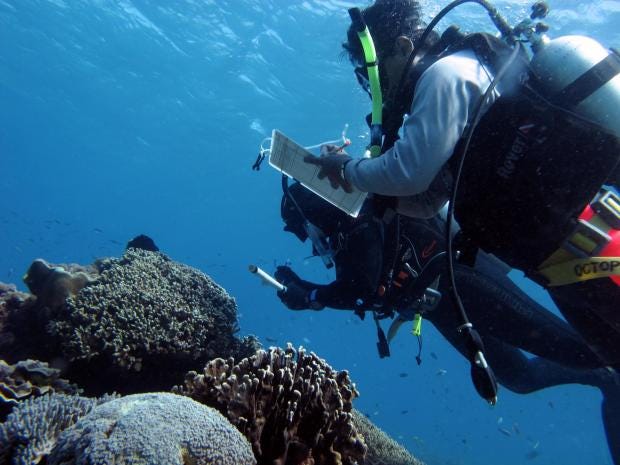Beautiful underwater gardens massively reduce levels of potentially deadly bacteria in the sea — preventing humans from getting diseases like dysentery and typhoid — researchers have discovered.
But these idyllic meadows of seagrasses, the most common coastal ecosystem on Earth, are in serious trouble with dramatic, year-on-year declines recorded since 1990.
And that could mean further problems for coral, upon which much of marine life depends, which is also suffers from bacterial infections. Coral is already experiencing major bleaching events as the temperature of seas around the world rises.
It is known that seagrasses have an antibacterial effect, but the findings of the new study of heavily populated islands in the Spermonde archipelago in Indonesia were unexpectedly dramatic.
For in areas near the meadows, the amount of bacteria was about half the levels found in places with no seagrass.
For the scientists involved this was not simply a matter of science, but their own health.
Professor Drew Harvell, of Cornell University, had been investigating the health of corals with colleagues in the archipelago when the entire research team fell ill with dysentery and one scientist even got typhoid.
“I experienced firsthand how threats to both human health and coral health were linked,” he said.
“The beautiful oceanside water looked blue-green, but truly it was filled with dangerous pollution — some really bad stuff in the water close to shore.
“The genetic sequencing work pinpointed the kinds of bacteria —all in difficult, arduous conditions. It showed exactly what was in the water.”
In tests, the water was found to contain 10 times the level of one type of bacteria, called Enterococcus, that is considered safe.
Dr Joleah Lamb, also of Cornell University, and colleagues to return to investigate further and this led them to the discovery of just how effective seagrasses are at reducing harmful bacteria.
Writing in the journal Science, they said: “We found that when seagrass meadows are present, there was a 50 per cent reduction in the relative abundance of potential bacterial pathogens capable of causing disease in humans and marine organisms.
“Moreover, field surveys of more than 8,000 reef-building corals located adjacent to seagrass meadows showed two-fold reductions in disease levels compared to corals at paired sites without adjacent seagrass meadows.
“These results highlight the importance of seagrass ecosystems to the health of humans and other organisms.”
Further studies revealed the numbers of several pathogens that affect fish and invertebrates were also about 50 per cent lower in seagrass gardens.
But Dr Lamb warned the meadows themselves were in sharp decline.
”Global loss of seagrass meadows is about seven per cent each year since 1990," she said.
“Hopefully this research will provide a clear message about the benefits of seagrasses for human and marine health that will resonate globally.
“Our goal is to stop measuring things dying and find solutions. Ecosystem services like seagrass meadow habitats are a solution to improve the health of people and the environment. Biodiversity is good for our health.”
The antibiotic properties of seagrasses have already been used to save billions of pounds.
For example, New York City decided to buy and restore a wetland area instead of building an $8bn (£6.4bn) water treatment plant.


【容大千量】